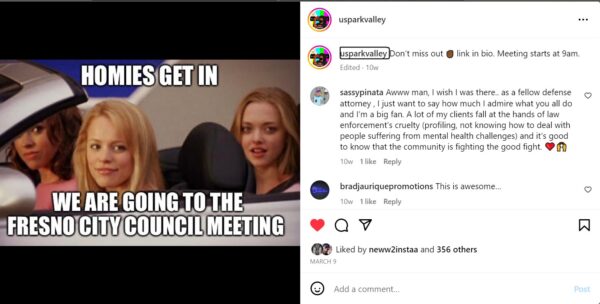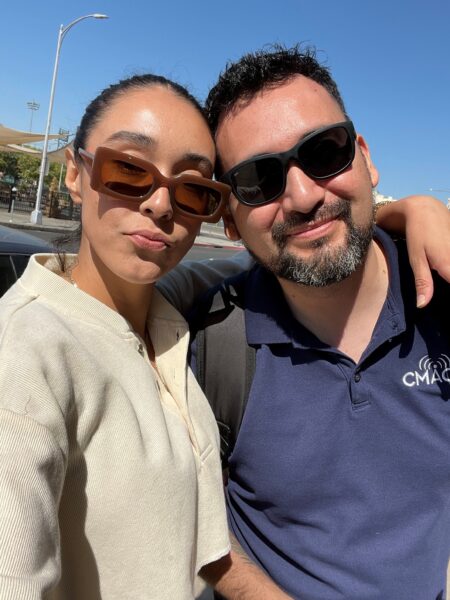
Around 3 years ago the LPC did a deep dive into assessing the information ecosystem of California’s Central Valley. As part of that effort, local media maker Sergio Cortes pitched supporting his new civic media outlet uSpark to fill information gaps in the region. Sergio was kind enough to join us for a Q and A about his journey looking for sustainability.
What’s been the hardest thing about fundraising for your civic media startup?
I originally started uSpark because I saw a gap in how news and information was being shared with communities of color, especially Millennials and Gen Zers, in California’s Central Valley. It was a part-time endeavor when I launched, I had a full-time job, and 2 years in, the outlet has grown and succeeded, but I’m still figuring out the fundraising piece.
Asking my community to invest in my civic news startup, uSpark, was initially very scary. When I noticed other organizations across the country depending on community funding, I realized that when people believe in something they contribute to it. At that moment, I decided to push the notion of asking people to give, and I did so through Patreon, a website where people can subscribe and donate to causes, mostly for content creators. As we built our audience, we were able to convert around 100 followers to be financial supporters through Patreon, which helped us supplement the start-up costs of running uSpark.
Patreon and startup grants from the Listening Post Collective have kept us going so far, but we’re trying to diversify where our support comes from. We also have a table at a monthly art hop, where we solicit new members and sell some simple merchandise which people like, and this summer we’re working on teaming up with some local businesses (breweries and food trucks) to do some topic focused events.

Sergio Cortes and Fabiola Sahagún of uSpark
What’s something crucial you’ve learned in the past 3 years about running a media startup?
Something I’ve learned over the past three years is that passion alone cannot sustain a newsroom or our digital platform. Despite my team and my uSpark partner, Fabiola, being passionate about uSpark, passion doesn’t pay rent, bills, or for gas. The world just doesn’t work that way. So, the question becomes, how can we make this tangible, real creation that’s taken off sustainable? For starters, we’re in the process of establishing a budget that better reflects our newsroom’s needs, lining up money that’s coming in with our main spending priorities. Our big goal right now is increasing our budget so it provides a living wage to our two-person team. It’s about determining where the money should go, what we should invest in, and realizing that we’re worth the investment when we go out to ask for support.
What role do you think equity and race play in fundraising?
I’m Mexican and undocumented and Fabiola is a first-generation immigrant. We’re a Brown newsroom. Honestly, from our experiences, fundraising is predominantly a white space. It’s a space people of color have long been denied access to. When we’re trying to fundraise we feel like we have to talk a certain way, appear a certain way, approach funders a certain way to get to be seen as legit. Sometimes we have to downplay our brownness and life experiences.
Fresno is a majority non-white community, one that’s been marginalized and under-resourced for so long. So, asking them to deal with a paywall to get access to important information is complicated. News should be community-driven, and funders must invest in new, community-led news organizations like uSpark that may not follow the models of legacy outlets or publications. Just because we don’t have the same model as legacy media outlets doesn’t mean we don’t know what we’re doing. We’re offering something different, successful, that’s being well received by the community because we are part of that community.
Both Fabiola and I grew up where we work, we were literally raised by this community. We’ve seen the good and the bad. We too have felt burned by legacy media outlets in our area, how they’ve depicted us and the communities we grew up in. The shift in narrative we’re advocating for is personal. We know what we’re doing and we believe in what we’re doing and the community believes in us. And we hope foundations, especially ones that might not be from the community, value that connection as worth investing in.
In an ideal world, what role do you think a community can play financially in sustainability of something like uSpark, as opposed to a foundation that gives grants?
In an ideal world I believe that we should all share collectively in news. It’s a community project. Think about a community garden, in a food desert the community comes together to grow their food and share their food. My vision for news is similar. Let’s get together and figure out what information people need, how best to get them that information, and start planting that news in the community. Luckily, uSpark was part of an Information Ecosystem Assessment of the Central Valley, so we have a blueprint for how to reach folks. And connecting people with good information, we hope, leads to financial support.
We recently put the word out that we needed to pause our reporting in order to fundraise, and we directed the community towards a new membership system that we’ve created. Literally overnight, they responded. It’s a really gratifying thing to see fellow community members prioritize our work as important to their everyday lives and find a way to support it financially.
What’s your best sales pitch for funding uSpark?
For foundations, I could give the typical response, here’s reasons A, B, and C. But, at the end of the day, we’re doing this with or without your help. We would love to do this with you. We would love for you to walk alongside us and support us. We want foundation support, but funders also have to understand what we’re doing may not look like what they’ve funded in the past. In addition to delivering necessary community news, we’re actively trying to shift narratives around BIPOC residents (the majority in our community) away from legacy media depictions that marginalize and criminalize people of color. Our audience is fed up with that and doesn’t want to be a part of that system anymore. Funders have to want to be part of this shift.
Also, the digital aspect of what we’re doing might be new, but our community and content goals aren’t. We stand on the shoulders of past publications like La Raza, the Chicano rights magazine that launched in Los Angeles in the 60s and 70s. We’re doing something similar. We may not be considered “legacy media”, but uSpark is upholding a legacy, one that’s too often been marginalized and lacked the funding it deserves to see what kind of impact supporting equity in media can have in communities across the US.
